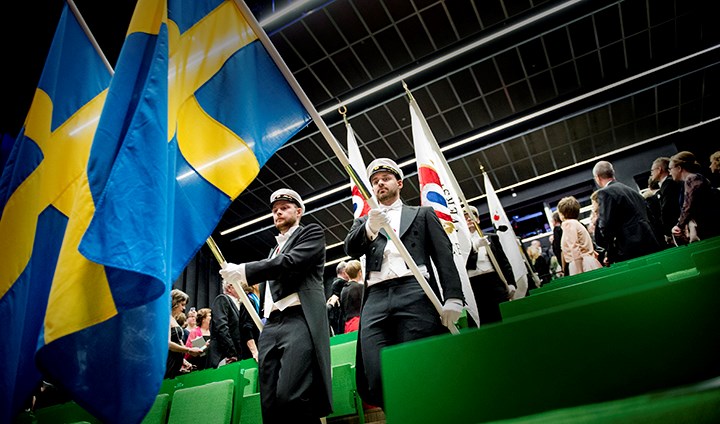A university – with the right to celebrate

In 2016, the doctoral students at Örebro University will grow substantially in number. The plan is to make room for an additional 30 compared to last year’s 55 new PhD entrants.
"This is a highly justified initiative. The admission of doctoral students has been on too low a level in the last two years and doctoral students are the foundation on which the future supply of teachers and researchers are built," says Örebro University's Vice-Chancellor Jens Schollin.
This weekend, Örebro University was celebrating in style. On its anniversary of becoming a university, new professors, new doctors and honorary doctors were honoured on the stage of the Aula Nova in the most recent addition on campus, Novahuset, before an audience in gala dress.
Academic pomp and circumstance offers a grand image of Örebro University. However, it is the everyday achievements that are the real reasons for celebrating as they provide the runway for the future.
Looking back, 2015 saw upward trends, a few record achievements, maintained top-level positions, an eagerly awaited yes – and a major surprise.
Five-year degree programme
Firstly, the "yes". A decision last spring by the Swedish Higher Education Authority, UKÄ, granted Örebro the right to introduce an MSc in Engineering. This autumn, we will premiere two specialisations of this five-year degree programme – those in computer science and in industrial and management engineering.
"I would argue that with the start of the MSc in Engineering, Örebro University is now a much more complete higher education institution than before. And with that in mind, combined with the great demand from the regional business and industry sectors, we are of course very pleased to see the launch of these programmes in the autumn," Jens Schollin comments.
The degree programmes in law, medicine and psychology at Örebro University are on the list of the most sought-after programmes – in the country. In addition, Örebro contributes with another six among the top 80 degree programmes with the most applicants per place. Örebro University is also, alongside Gothenburg and Lund, the university with the highest number of degree programmes that are ranked among the most popular. This popularity is reflected in the fact that eight out of ten students at Örebro University are from outside the Örebro region.
Our students do well
Higher education leads to jobs. A fresh report from UKÄ shows that 84 per cent of Örebro University graduates were established on the labour market within a year of graduation. This compares with a national average of 81 per cent. Only one other broad-based university has a higher graduate employability rate than Örebro University.
"That our students do well when they leave the university is great. And as we are investing in professional degree programmes, we are pleased to see that our graduates fare well in the competition on the job market," says Jens Schollin.
The procession of professors and doctors at the annual academic celebration is a manifestation for research. The graphs for 2015 are pointing upwards for Örebro University, in terms of both research volume and the number of research grants obtained. In 2015, additional government funding was made available to expand the research partnership between the programme in medicine and the healthcare provider Region Örebro County. The challenge now is to increase the number of research grants from external funding bodies, such as the Swedish Research Council and the Knowledge Foundation.
Now to the surprise
Now to the surprise. In the autumn it was announced that Örebro University had placed itself among the top 350 universities, out of 17,000, on the Times Higher Education World University Rankings, one of the most prestigious global university rankings. This position is particularly significant for creating partnerships with universities outside Sweden. A perfect example of this is the early-stage partnership with Aston University in Birmingham, UK.
With the help of a panel of external experts, the university has also performed its own research evaluation, ORU2015. The findings in the evaluation report will have a significant impact on the future direction of research at Örebro University.
"Over the past year, the university has made significant progress in its development. Naturally, however, there are still areas where we need to improve further. Besides the admission of doctoral students and the increase of external research grants, we also need to improve our recruitment efforts. The competition with other higher education institutions is fierce indeed, and herein lies a major challenge," concludes Jens Schollin.
Text: Maria Elisson
Translation: Charlotta Hambre-Knight
Photo: Kicki Nilsson
